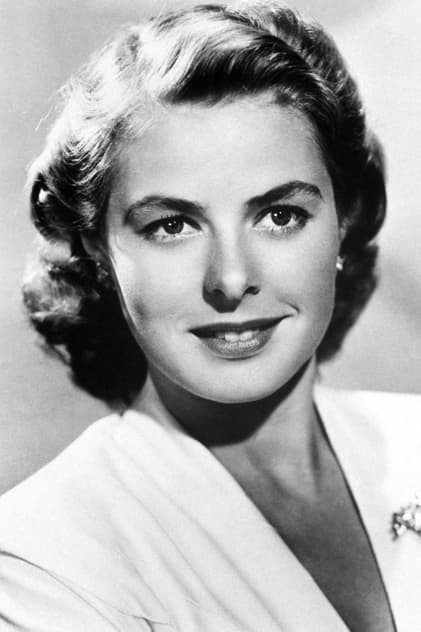

Ingrid Bergman
Birthday
August 29, 1915 (67 years)
Place of Birth
Stockholm, Sweden
Known For
Acting
Biography
Ingrid Bergman (August 29, 1915 – August 29, 1982) was a Swedish actress who starred in a variety of European and American films, television movies, and plays. With a career spanning five decades, she is often regarded as one of the most influential screen figures in cinematic history. According to the St. James Encyclopedia of Popular Culture, upon her arrival in the U.S. Bergman quickly became "the ideal of American womanhood" and a contender for Hollywood's greatest leading actress. David O. Selznick once called her "the most completely conscientious actress" he had ever worked with. In 1999, the American Film Institute recognised Bergman as the fourth greatest female screen legend of Classic Hollywood Cinema. She won numerous accolades, including three Academy Awards, two Primetime Emmy Awards, a Tony Award, four Golden Globe Awards, BAFTA Award and a Volpi Cup. She is one of only four actresses to have received at least three acting Academy Awards (only Katharine Hepburn has four). Born in Stockholm to a Swedish father and a German mother, Bergman began her acting career in Swedish and German films. Her introduction to the U.S. audience came in the English-language remake of Intermezzo (1939). Known for her naturally luminous beauty, she starred in Casablanca (1942) as Ilsa Lund, her most famous role, opposite Humphrey Bogart. Bergman's notable performances in the 1940s include the dramas For Whom the Bell Tolls (1943), Gaslight (1944), The Bells of St. Mary's (1945), and Joan of Arc (1948), all of which earned her nominations for the Academy Award for Best Actress; she won for Gaslight. She made three films with Alfred Hitchcock: Spellbound (1945), with Gregory Peck, Notorious (1946), opposite Cary Grant and Under Capricorn (1949), alongside Joseph Cotten. In 1950, she starred in Roberto Rossellini's Stromboli, released after the revelation she was having an affair with Rossellini; that and her pregnancy prior to their marriage created a scandal in the U.S. that prompted her to remain in Europe for several years. During this time she starred in Rossellini's Europa '51 and Journey to Italy (1954), now critically acclaimed, the former of which won her the Volpi Cup for Best Actress. She had a successful return to working for a Hollywood studio in Anastasia (1956), winning her second Academy Award for Best Actress. Soon after, she co-starred with Grant in the romance Indiscreet (1958). In 1969, she starred in the acclaimed and highly successful film Cactus Flower. In later years, Bergman won her third Academy Award, this one for Best Supporting Actress, for her role in Murder on the Orient Express (1974). In 1978, she starred in Ingmar Bergman's (no relation) Swedish Autumn Sonata receiving her sixth Best Actress nomination. Bergman spoke five languages – Swedish, English, German, Italian and French – and acted in each. In her final role, she portrayed the late Israeli Prime Minister Golda Meir in the television miniseries A Woman Called Golda (1982) for which she posthumously won her second Emmy Award for Best Actress. In 1974, Bergman discovered she was suffering from breast cancer but continued to work until shortly before her death on her sixty-seventh birthday.
Ingrid Bergman Movies & TV-shows on Netflix
Movies with Ingrid Bergman
Casablanca
Jan 15, 1943
Murder on the Orient Express
Nov 22, 1974
The Parades
Feb 28, 2024
Gaslight
May 4, 1944
Notorious
Aug 21, 1946
Spellbound
Nov 8, 1945
For Whom the Bell Tolls
Jul 12, 1943
Bogart: Life Comes in Flashes
Nov 15, 2024
Goodbye Again
May 23, 1961
Cactus Flower
Dec 16, 1969
Dr. Jekyll and Mr. Hyde
Aug 12, 1941
Anastasia
Dec 13, 1956
TV shows with Ingrid Bergman
Apostrophes
Jan 10, 1975
Intimate Portrait
Nov 14, 1993
Abendschau
May 4, 2000
Spécial cinéma
Sep 25, 1974
BAMBI Awards
Jan 1, 1948
Tony Awards
Apr 1, 1956
The Steve Allen Show
Jun 24, 1956
The Steve Allen Show
Jun 24, 1956
Dim Dam Dom
Mar 7, 1965
Alfred Hitchcock Presents
Oct 2, 1955
ABC Stage 67
Sep 14, 1966
Cinépanorama
Feb 4, 1956